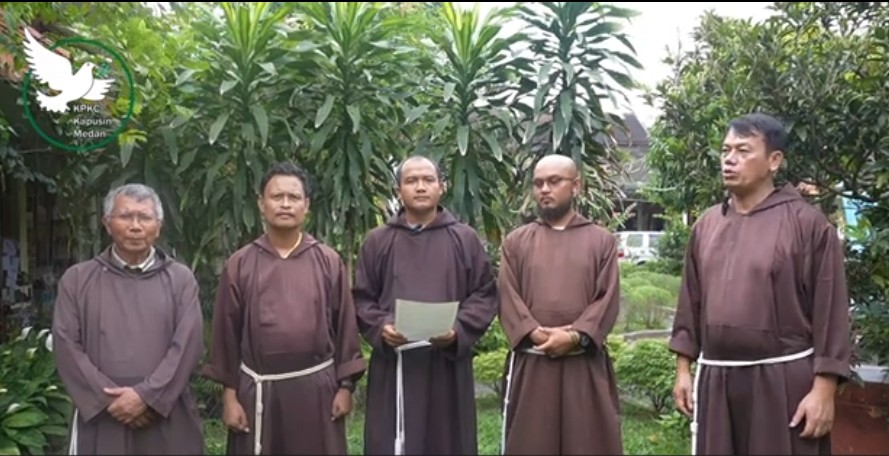Medan: Capuchins stand by Indigenous Batak against land grab
For years, a battle has been raging between local people and the pulp and paper giant PT Toba Pulp Lestari (TPL). Yesterday, a rally turned violent after heavy-handed police intervention. Religious leaders raised the issue in parliament. Biodiversity and natural ecosystems are at risk.
Jakarta (AsiaNews) – The Capuchins in Medan and religious leaders in the province of North Sumatra have come to the aid of the Batak, a tribal people involved in a long-running battle to defend their lands from industrial giant PT Toba Pulp Lestari (TPL).
A new chapter in the conflict unfolded yesterday when ethnic Batak staged a protest that was forcefully repressed by the police until the intervention of Fr Walden Sitanggang, a member of the Justice, Peace, and Integrity of Creation Office (JPIC) of the Archdiocese of Medan.
The priest rushed to the scene of the rally to safeguard the lives of dozens of people whose futures are at risk. “I will never leave these people behind,” he stressed.
The violent and often deadly conflict between Indigenous communities and the pulp and paper giant PT Toba Pulp Lestari (TPL) shows no sign of abating after nearly 40 years.
Thousands of hectares of traditional land in Tano Batak have been claimed by the pulp and paper company as its exclusive concession area with serious consequences for villagers who have lost their livelihoods as ancestral forests are cut down, and scores of people treated as criminals.
Since 1986, the company has been repeatedly accused of converting old-growth forests into monoculture eucalyptus plantations.
The young Capuchin priest who spoke to AsiaNews about yesterday's incident explained that the diocesan organisation's commitment to helping Indigenous peoples is not limited to the Simalungun district of North Sumatra.
Together with other activists and political leaders, “we came to Jakarta to bring the issue of land grabbing to Indonesia’s parliament like what happened last 9 September,” he explained.
The initiative was backed by several NGOs, like the Community Initiatives Development Group (KSPPM), the Alliance of Indigenous Peoples of the Tano Batak Archipelago (AMAN), Church leaders (HKI), the Capuchins in Medan, and Catholic associations in the province.
They expressed their concerns about the environment to the lawmakers and reported cases of violations and abuses; they also called for an immediate halt to TPL’s operations in Tano Batak.
The JPIC office of the Archdiocese of Medan, led by the Capuchins, has spoken out against the growing environmental exploitation in the Toba Lake region, emphasising the need to protect the rights of Indigenous peoples and preserve ecosystems.
JPIC Director Fr Sumitro Sihombing, a Capuchin, warned that unchecked clearcutting had triggered floods, landslides, droughts, biodiversity loss, and land conflicts, inflicting great suffering on communities who have depended on nature for generations.
The Medan-based Catholic organisation stated that it supports the efforts by the government and civil society groups to preserve Toba Lake and buffer zones.
This preservation requires rejecting exploitative practices driven solely by profit, which ignore justice and future generations.
The JPIC also opposes the presence of PT Toba Pulp Lestari, which has damaged biodiversity and ecosystems, urging the government to protect the rights of indigenous peoples, safeguard traditional lands, and protect people from intimidation and violence.
Rusliana Marbun, an indigenous farmer from Matio, a village in Toba Regency, has experienced firsthand the conflict between the local Indigenous population and the pulp and paper plant firsthand.
Heavy machinery from PT Toba Pulp Lestari buried her rice field in 2015. When she protested, she was accused of assaulting a company employee and subsequently tried and convicted. "I was imprisoned," she said, "just for questioning why the company destroyed my rice field.”
According to the Alliance of Indigenous Peoples of the Archipelago (AMAN) Tano Batak and KSPPM, TPL has claimed over 20,754 hectares of indigenous land in five regencies.
The North Sumatra People's Legal Aid and Defence Organisation (BAKUMSU) has documented at least 93 cases of Indigenous people accused of various offences, most under Article 92 of Law No. 18/2013 on the Prevention and Elimination of Forest Destruction.
“As long as the law remains repressive towards communities, the threat of criminalisation will persist,” said BAKUMSU Director Tongam Panggabean.
In addition to legal woes, Indigenous people have lamented the loss of their livelihoods due to the felling of frankincense trees, which had been their main source of income for centuries; pesticides from eucalyptus plantations have also polluted springs and waterways, while many ancestral tombs have been destroyed as well.








.png)










